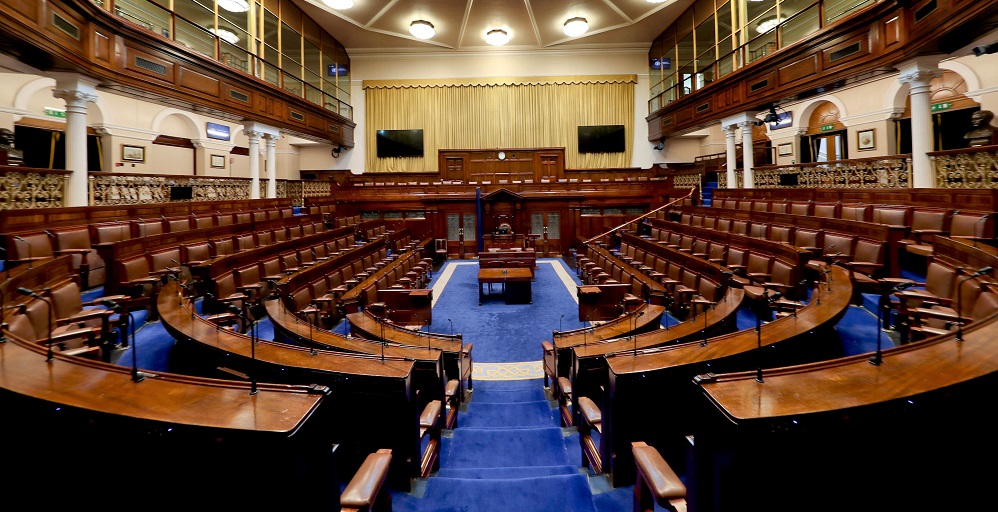Ward brings Jake’s Amendment to the Dáil
Mike Finnerty 16 Jul 2025
This article contains references to suicide that some readers may find distressing.
Local Sinn Féin TD Mark Ward has introduced new Dáil legislation which looks to amend a long-standing Irish law.
This week, Ward and his Sinn Féin colleagues introduced Jake’s Amendment, a modification to the Coroner’s Act of 1962.
The bill, which will now move to the second stage of the Dáil legislative process, would introduce the term “iatrogenic suicide” to the legislation, which refers to when a prescription drug is the primary cause in a person taking their life.
In legal terms, Iatrogenic suicide refers to the ending of one’s own life where the primary cause is the effect of medical treatment, including prescribed medication, administered by a healthcare professional.
To Ward, the legislation has personal significance; the Bill is named for a local boy who took their own life in 2013.
Jake McGill Lynch was 14 years old when he took his own life, and the Clondalkin boy was prescribed antidepressants shortly before his death.
Ward told the Dáil about the situation; he stated that Jake’s mother maintained that he wasn’t depressed but was suffering from exam anxiety and was prescribed fluoxetine.
“His mother had no idea it was actually Prozac or of the side effects it could have, including suicidal ideation,” he noted.
“Jake was diagnosed with Asperger’s. The evidence indicates Prozac has no benefit for children with Asperger’s. Despite the risk of harm, Jake was still prescribed this drug, and the coroner returned an open verdict.”
“If she had known, she would never have given it to Jake,” Ward said.
The Sinn Féin TD noted that the family welcomed the open verdict as the ruling “death by suicide” would not reflect their son’s death, which they believe was drug-induced.
“The coroner did say that Jake was not in his right mind, but he could not elaborate on the medication. As things stand, the coroner does not have the option to issue the verdict of iatrogenic suicide, and this is why we are introducing this Bill,” the Dublin Mid-West TD explained.
Ward also highlighted the story of Meath teen Darren Connell, who took his own life shortly after being prescribed anti-acne medication.
Darren was prescribed medication called doxycycline for the treatment of acne on 27 August 2019.
On 11 September 2019, he died by asphyxial hanging.
Ward noted that at the inquest, the coroner described the evidence put before him as “compelling” and made a recommendation to investigate the safety of his medication, and the coroner stated that Darren had “no intention” to die by suicide.
Ward’s party colleague, TD Johnny Guirke noted, “he (Darren) was a friend of my own son. He was looked up to by everybody and he was a great young fella. We have a 50-mile walk that we do every year for cancer and he walked it.”
“He probably would be with the Meath team in Croke Park next Sunday if he were still around,” the Meath West TD noted.
“This Bill is important to families like Darren’s as it would give them closure by having the correct verdict recorded. Darren’s family has asked for a joint meeting with the Minister for Justice and the Minister for Health.”
“The Minister for Justice has said he is open to meeting. The Minister for Health has had three submissions for a meeting, and Jim and Vera (Darren’s parents) have yet to hear back. It would be great if both Ministers could meet Darren’s parents and listen to their story.”
Guirke said it was a “no-brainer” for the government to back the bill.
These tragic situations, Ward stated, are an example of why these laws, which were drafted in the 1960s, need to be changed to meet the modern era.
Ward, who is Sinn Féin’s spokesperson on mental health, said “the ruling of suicide is hurtful for families who have suffered such loss, as they know that the medication was the primary cause of their children’s deaths.”
“I hope this Bill will give the families peace of mind in these situations; losing a child or a family member is already a traumatic time, a ruling of suicide where medication was the primary cause of their death only adds to it.”
Ward’s Sinn Féin colleague Pádraig Mac Lochlainn said there was a “missed opportunity” to bring in similar legislation when he served in the Seanad.
Mac Lochlainn attempted to introduce legislation during his term in the Seanad, but asserted that the government “shot down” the legislation as it had advice from the Attorney General on the topic.
He said that the government failed to provide an alternative to his legislation, which has left it in limbo in the interim.
“The issue is that people are dying – in this case, young people who have been given medication that has led to their deaths.”
“The core issue is that they are not responsible for their own deaths; the medication they were given is responsible. There must be recourse in law for that,” he told the Dáil.
Introduced to the Dáil on July 1, the bill reads, “this bill deals with the issue of iatrogenic suicide; it is an issue that must be highlighted.”
“A verdict of suicide, returned in accordance with the provisions of the Act of 1962, must be differentiated from a verdict of iatrogenic suicide. Iatrogenic suicide is the ending of one’s own life where the effect of medical treatment undertaken by the deceased, including any prescribed medication, is the primary cause of such an action.”
“This Bill seeks to change the law to give recognition to this differentiation in relation to a verdict that can be made following an inquest undertaken under the Coroners Act 1962.
Government minister with responsibility for mental health issues, Fianna Fáil’s Mary Butler, said that the government would not stand in the way of the bill.
With the Dáil due to go into summer recess later next week, the Bill is likely to remain dormant until the Dáil returns in September, but as stated, the government said they would not stand in the way of the bill and support it if Sinn Féin raises it as a private member’s bill.











